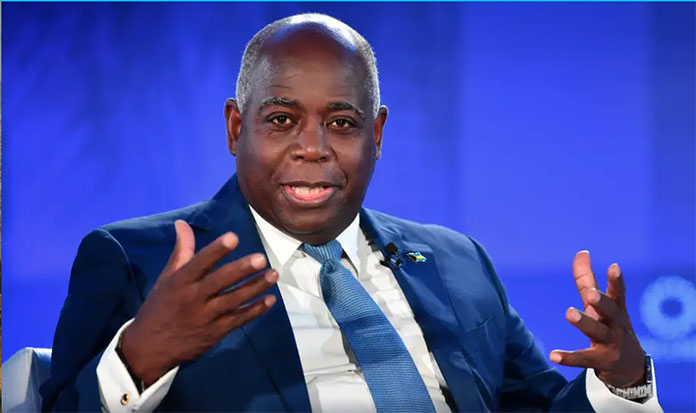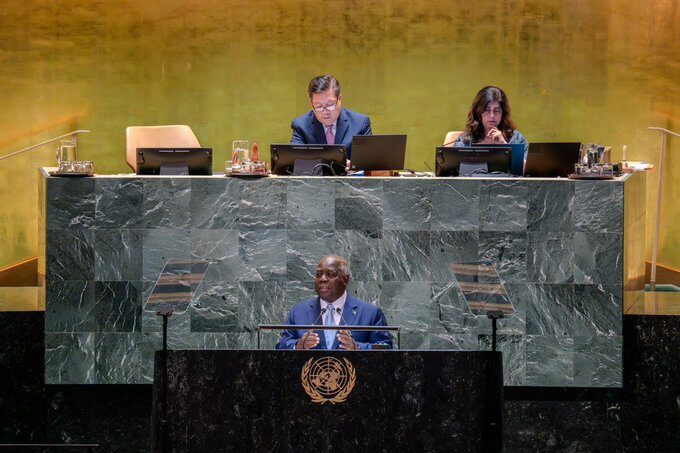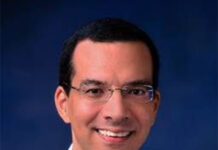
Mr. President,
Mr. Secretary General,
Your Excellencies.
My sincere congratulations to Ambassador Yang on your election as President of the General Assembly and to your predecessor Ambassador Francis. I trust that you will guide us and keep us on a steady course throughout this 79th Assembly.
Over the past three years, The Bahamas has been pleading with member states to engage in urgent action in respect of climate change.
Along with other Small Island Developing States we have highlighted our vulnerabilities, and our predicament.
We have told you what we know, shared our experiences from the frontline, described what we are doing to address the various issues, and warned how, our yesterdays are your tomorrows.
There has been some welcome progress: but it falls far, far short, of what is needed.
And now we all have to live with the reality of a climate crisis, that has pushed our planet past the critical threshold of 1.5°celsius for an entire year.
At this very moment, the new harsh reality manifests in hurricanes and heat, fire and floods.
Member states can somehow quickly find eye-watering sums of money for bullets and bombs, but only rattle small change in their pockets when it comes to financing the costs of loss and damage, repair and recovery, so desperately needed to adapt to the new climate reality.
Why?
Why do members persist in ignoring the biggest threat of our lives?
The easy answer would be to say that you just don’t care.
But I cannot accept that.
To do so would be to accept a view of humanity which is at odds with my Faith and lived experience of humanity.
But we in The Bahamas clearly see that lack of determined, committed action, as a series of misguided, short-term choices and priorities.
We can choose differently.
We can choose better.
We can act to address real, consequential priorities, priorities that are already impacting the lives of every single one of us, and will continue to impact the lives of our children and their grandchildren for generations to come.
Candidacy for Security Council
The irony is that generations before us did not have an established forum such as this: a place to come together, as a whole world, to work together for the common good.
The genocidal crisis of the Second World War gave birth to the United Nations, and the ensuing wars of Independence, and regional conflicts means that we have in place, the structure for real, effective action.
And so today, as The Bahamas celebrates 51 years of membership of the United Nations, we offer our service to the international community as we bid for non-permanent membership of the Security Council, for the term 2032-2033.
We do so because the present crisis of today, the looming crisis of tomorrow, requires even greater degrees of ingenuity, effort, multilateral co-operation and sacrifice, than the world needed in the aftermath of the Second World War.
We understand well that the Council’s mandate to maintain international peace and security goes far beyond the mere absence of war.
But we also know that, from where we stand, on the frontline of the impact of climate change on humanity, that the mandate “to co-operate in solving international problems” now, more than ever, requires us to stand up and step forward.
We do so to amplify the voices of Small Island Developing States.
We do so, because the voices of Small Island Developing States are the harbingers of what lies in store for all of us.
The Security Council of the future will not be equipped to deal with the biggest crisis of our time, without voices like ours at the table.
The link between climate change and global security is undeniable.
Things are bad now, and they are going to get a lot worse, before they get better.
Climate considerations must be integrated into all aspects of the Security Council’s work.
Because of this, The Bahamas stands ready to advocate and support whatever reforms are needed, to help maximise the effectiveness of the work of the Council.
Membership for countries like ours was not what the Charter members contemplated when the UN was established.
But it is countries like ours which will help the Council with the inclusive, truly representative decision-making, needed to help address the greatest crises of our time.
Economic Security
Friends:
Aspirations to lasting global peace and security will remain empty dreams, if not supported by economic security.
For too long, the global financial system has been skewed against developing nations.
It is a cruel irony, that industrialized nations who bear the greatest responsibility for the climate crisis, often perpetuate another form of injustice in the form of our current, global system.
We have been instrumental in exposing the hypocrisy of unilateral blacklisting, and advocating for a framework that prioritizes fairness and inclusivity.
The present system, with its dark rules and uneven playing field, drains resources from developing countries, leaving us to grapple with the consequences.
The Bahamas refuses to accept this double standard.
We are raising our voice to demand a fairer, and more equitable international framework, one where the voices of all countries, regardless of population or GDP, are heard and respected.
The Bahamas will continue to be a leading voice in championing this issue for as long as we need to do so: no matter how lonely or how long the journey.
Unique Vulnerabilities of The Bahamas
Even among Small Island Developing States, The Bahamas is uniquely vulnerable.
We are not waiting for solutions: we are creating them.
We have created a National Youth Guard, empowering our young people to become environmental champions because we know that future generations will have an enormous burden to shoulder.
We are embracing innovation, particularly in the realm of ocean technology, to find solutions to the climate crisis.
The Bahamas may be small in size, but we are not short on ambition or ingenuity.
We have it said it before, but we can never say it often enough.
Countries like The Bahamas contribute so little to the problems of the world, and yet we are among the first and greatest affected.
Over 40% of my country’s national debt is as a direct result of the impacts of climate change.
Locked as we are, into an annual cycle of severe hurricanes, repair and rebuild, how can we fulfil the reasonable aspirations of our people for national development?
Climate Change: A Threat Multiplier
We need to stop thinking of climate change merely as an environmental threat.
It is a threat-multiplier, exacerbating existing tensions, creating new ones, and undermining the very foundations of global security.
If we think we have refugee challenges now, do we really want to wait until millions more are forced to cross borders, just to survive?
As resources become scarcer, as livelihoods are lost, the potential for conflict, for instability, and mass migration, becomes inevitable.
Haiti
Your Excellencies:
In our Caribbean region, the Republic of Haiti is facing a multi-dimensional security crisis. It is borne of gang violence and resource scarcity, made worse by massive earthquakes, hurricanes, and other natural hazards.
In accordance with UNSC Res. 2966 passed in 2023, and in coordination with the Government of the Haiti, member states are contributing to the Multinational Security Support Mission.
The Bahamas government is strongly of the view that any mission in Haiti ought to be Haitian-led, and aim to build the capacity of the Haitian National Police to counter gangs and improve security conditions.
The Bahamas reiterates the importance of continued and sustained financial support from donor countries, to ensure that the UN Trust Fund is able to fund MSSM operations now and in the future.
South/South Development Co-operation
Looking beyond our region, in 2024, The Bahamas has looked to South-South Cooperation to fill the gaps in development support.
We continue to be active participants in Caricom.
We value the support of the Commonwealth, and the solidarity between Caribbean and Pacific Commonwealth states, and look forward to meeting this year in Samoa.
We value the deepening relationship between Caricom and the African region.
We see renewed value in the Group of 77, and the Non-Aligned Movement.
Our concerted efforts to collectively focus on climate reparations have resulted in new pathways to climate justice at the International Tribunal for the Law of the Sea, and at the International Court of Justice.
We remain determined to protect and preserve our climate and our precious biodiversity through the progressive development of international law.
COP29
COP29 must be a turning point.
It is estimated that by 2050, climate-related damage is projected to rise to an almost unimaginable $38 trillion per year.
My friends, in some respects, it is already too late.
Where we are…. is not good.
But there’s still time…time just enough…if we act and act now.
Let’s revitalise the stalled negotiations on the ‘New Collective Quantified Goal’ on climate finance.
We cannot afford another year of inaction.
Developed nations must step up, not just with words, but with enforceable, concrete commitments, that reflect the scale and urgency of the crisis.
Loss and Damage Fund
While global military expenditure soared to an unprecedented $2.4 trillion last year, the Loss and Damage Fund, painstakingly established at COP28, has secured a mere $800 million in pledges.
This is a drop in the ocean, compared to the trillions needed to address the escalating costs of the negative impacts of climate change.
This is not just an issue of funding.
It is fundamentally an issue of sustainability and survival.
Without it, peace and security mean nothing.
The Loss and Damage Fund must be fully operationalized.
This is about responsibility, accountability, and building a future where those who have polluted the most, contribute the most to cleaning up the mess.
The 1.5 degrees Celsius Reality
The rise in global temperatures of more than 1.5°C this past year has put us in a new reality.
But we must do more than roll the dice.
Real effort, serious action, tangible progress – these are the only paths to sustainable solutions.
And the same truths remain.
We must prioritise energy solutions around sources of renewable energy.
Re-directing the vast subsidies given to the fossil fuel industry towards renewable energy and climate adaptation and mitigation, would be a powerful start.
We must reform the Global Financial Institutions and systems.
We need multilateral development banks that are fit for purpose, providing accessible finance, and prioritizing climate-resilient investments.
We must continue to work to strengthen international co-operation.
We need a renewed commitment to collective, multilateral action.
But, Friends:
Within this global emergency, we also see a glimmer of hope.
The 1.5°C threshold cannot be an endpoint, but a turning point; an opportunity to reject complacency and chart a new course, one grounded in innovation, collaboration, and a resolute commitment to a just and sustainable future.
We are not asking for a hand-out, but for a hand up.
Even the strongest swimmer drowns if left alone in a raging sea.
Call for Removal of Cuba Blockade
I would be remiss if I had to leave this podium without joining my sister, Prime Minister of Barbados, in calling and renewing my call for the removal of the blockade in Cuba.
It is hurting the people of Cuba. And though it is said that the blockage is against Cuba, it is the people of Cuba who suffer daily.
It has not worked, it’s been in place now for over 70 years. So why should it still remain?
We call upon all of us here present to persuade those who have the blockade to remove it, and move it as soon as possible.
Thank you for listening.








